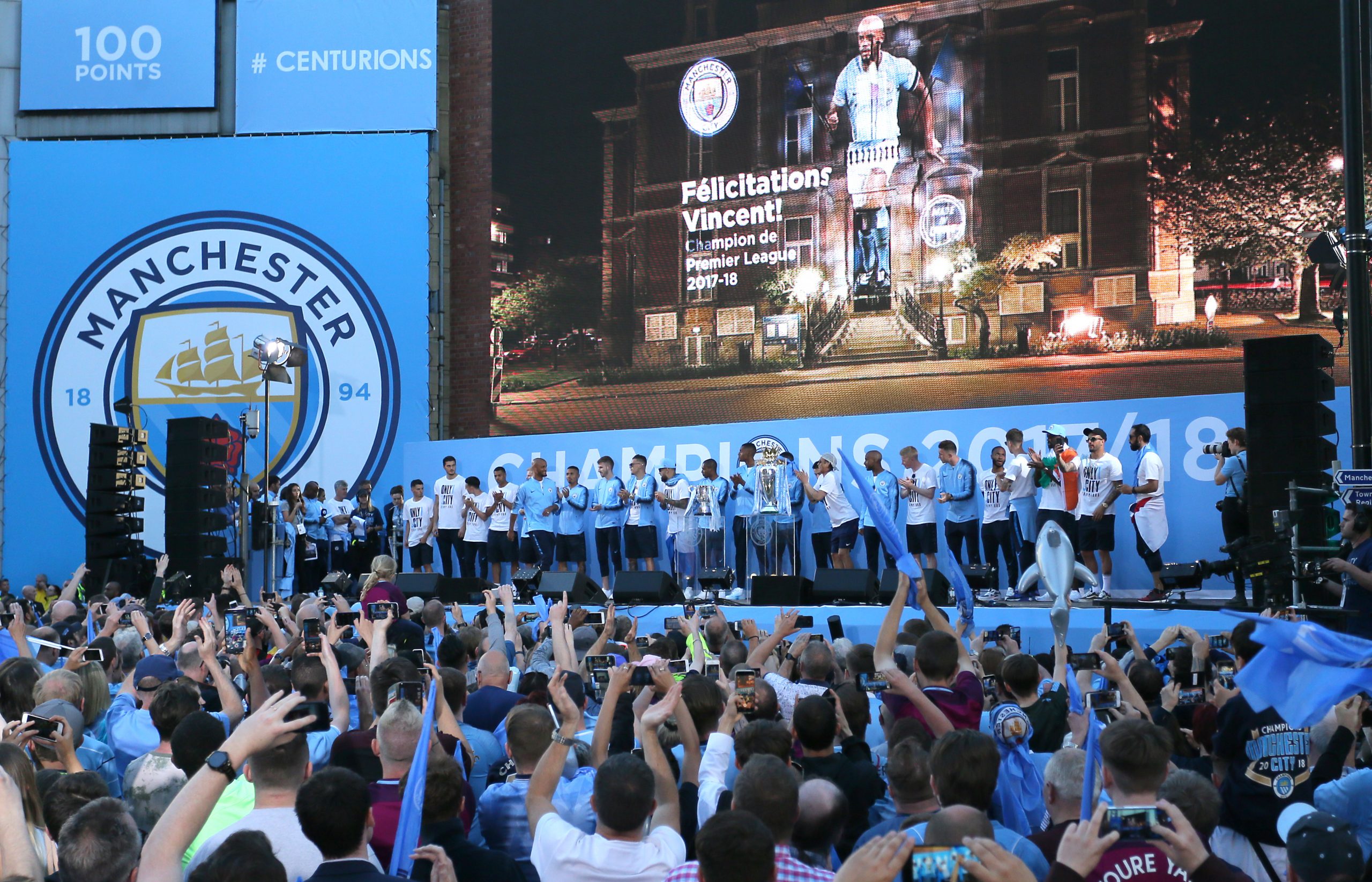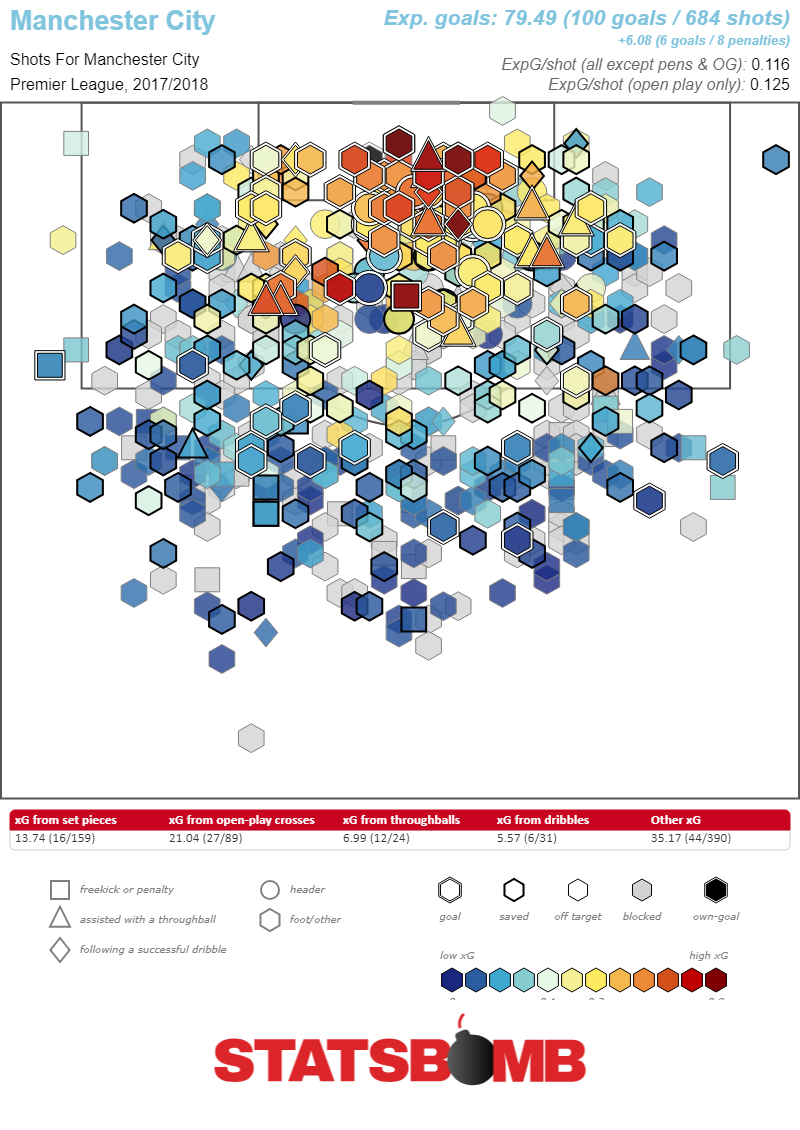Well. That went alright didn’t it?
Manchester City’s 2017/18 was nonsensically good. They broke so many records (most points, best goal difference, most wins, ad infinitum) that even fervent supporters will have lost track at some point. Pep Guardiola and co. did the same thing to the Premier League that they did to the Bundesliga with Bayern - perhaps to an even greater degree.
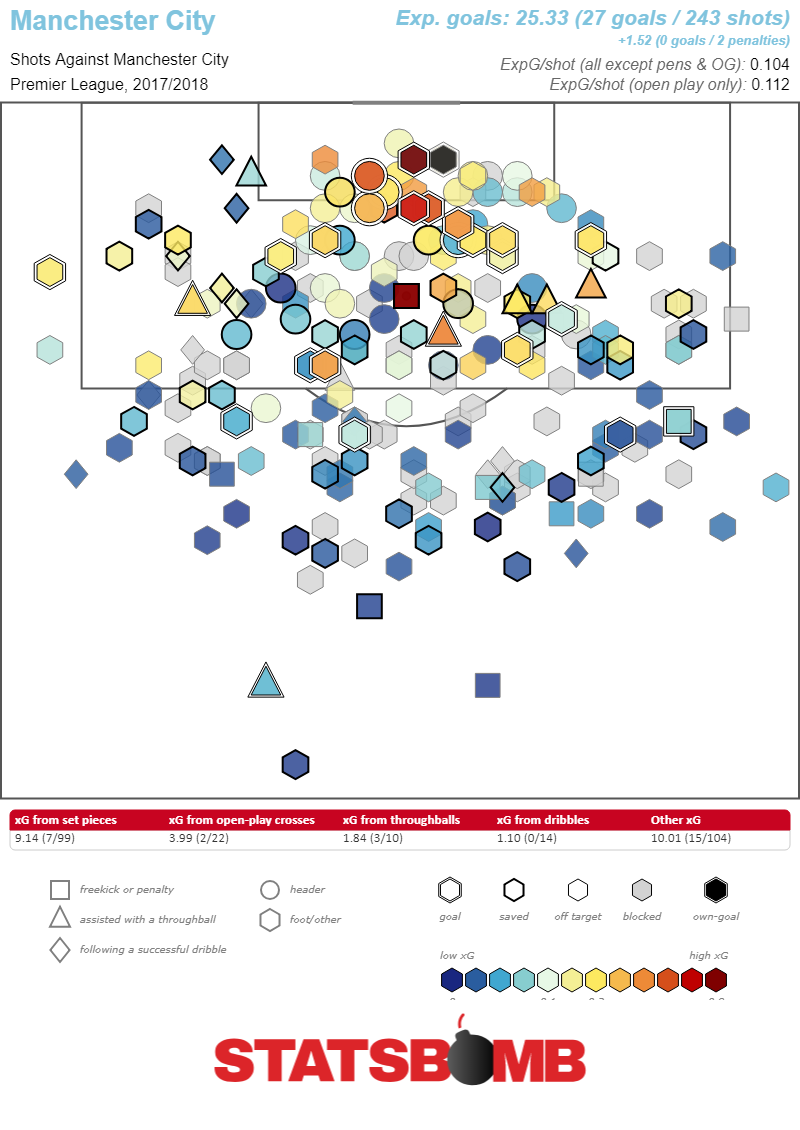
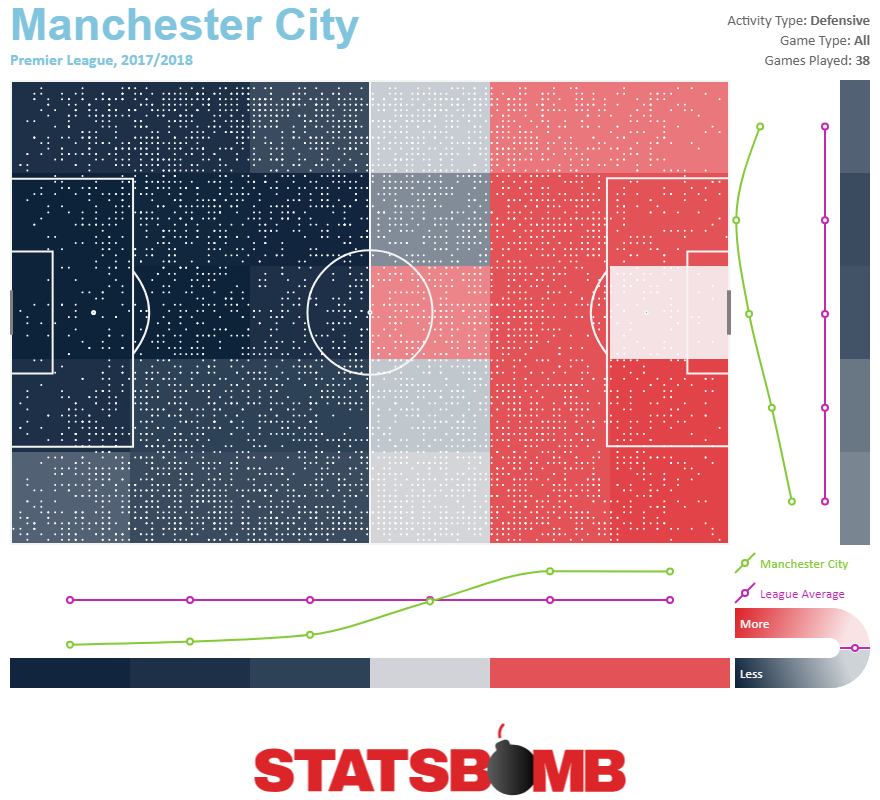
City's bread and butter is obviously their possession game. They had just shy of 1000 open play possessions that featured at least 10 passes last season. A bit over 200(!) more than the team with the second most. Their xG per possession on those 10+ pass possessions was - as you may have guessed - the best in the league.
All that possession high up the pitch has a clear tradeoff: lots of space in behind. The possibility of that space being exploited is they key defensive worry for any adventurous team, but City did an excellent job of marshalling it. And, to stay on theme, their xG per shot allowed on these was also the lowest in the league.
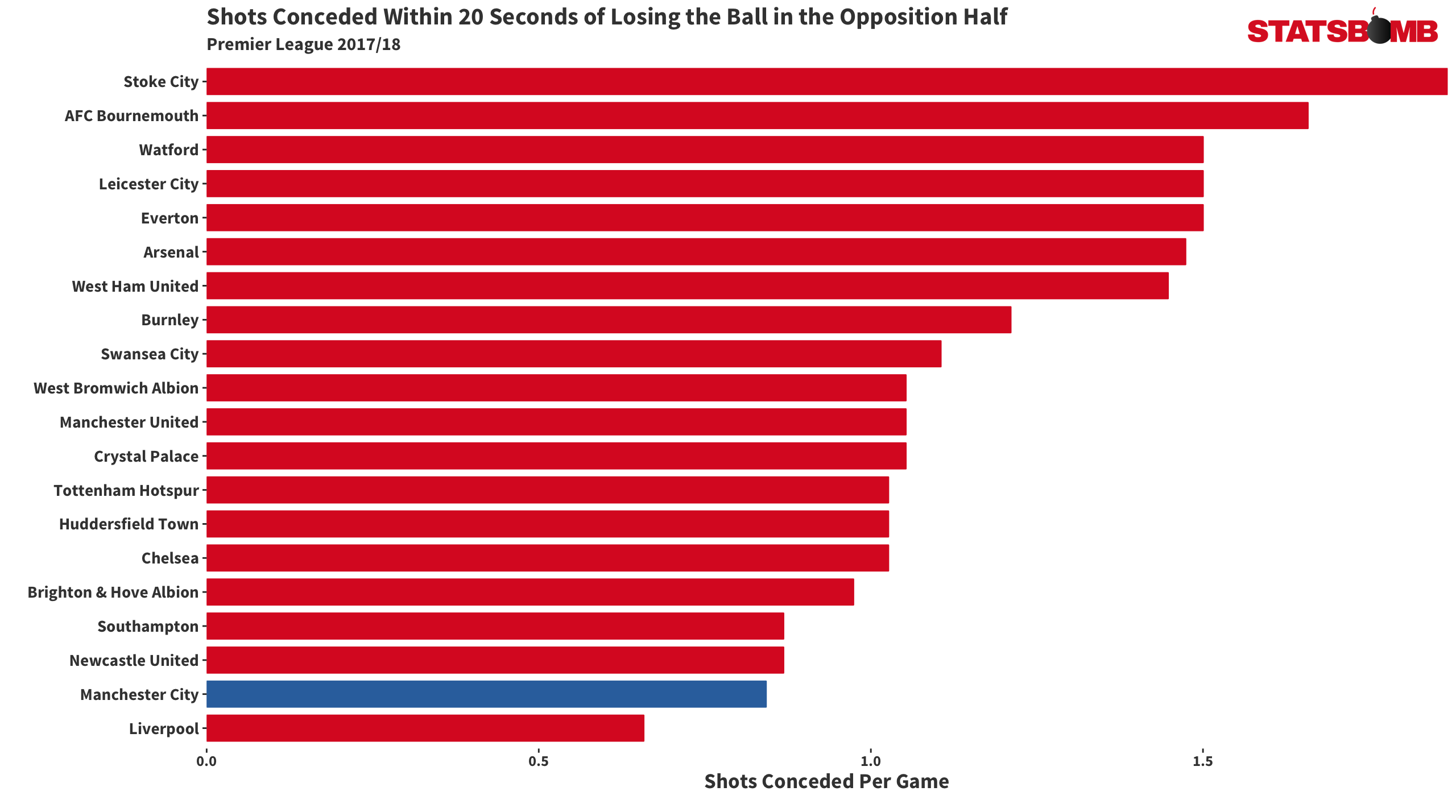
Yet their repertoire expanded beyond being slow, ball-hog masters. When you're facing bunkered defences so often it pays to squeeze extra bits of useful attack from your press (or closing down, if you prefer some good old fashioned terminology). The amount of shots City generated from off-ball defending - bearing in mind how much time they spend on the ball - was impressive. They allowed their share of chances on the other end (the percentage of their shots conceded where only the goalkeeper was in between shot-taker and goal was second highest in the PL) but gave up so few opportunities overall that it balanced out.
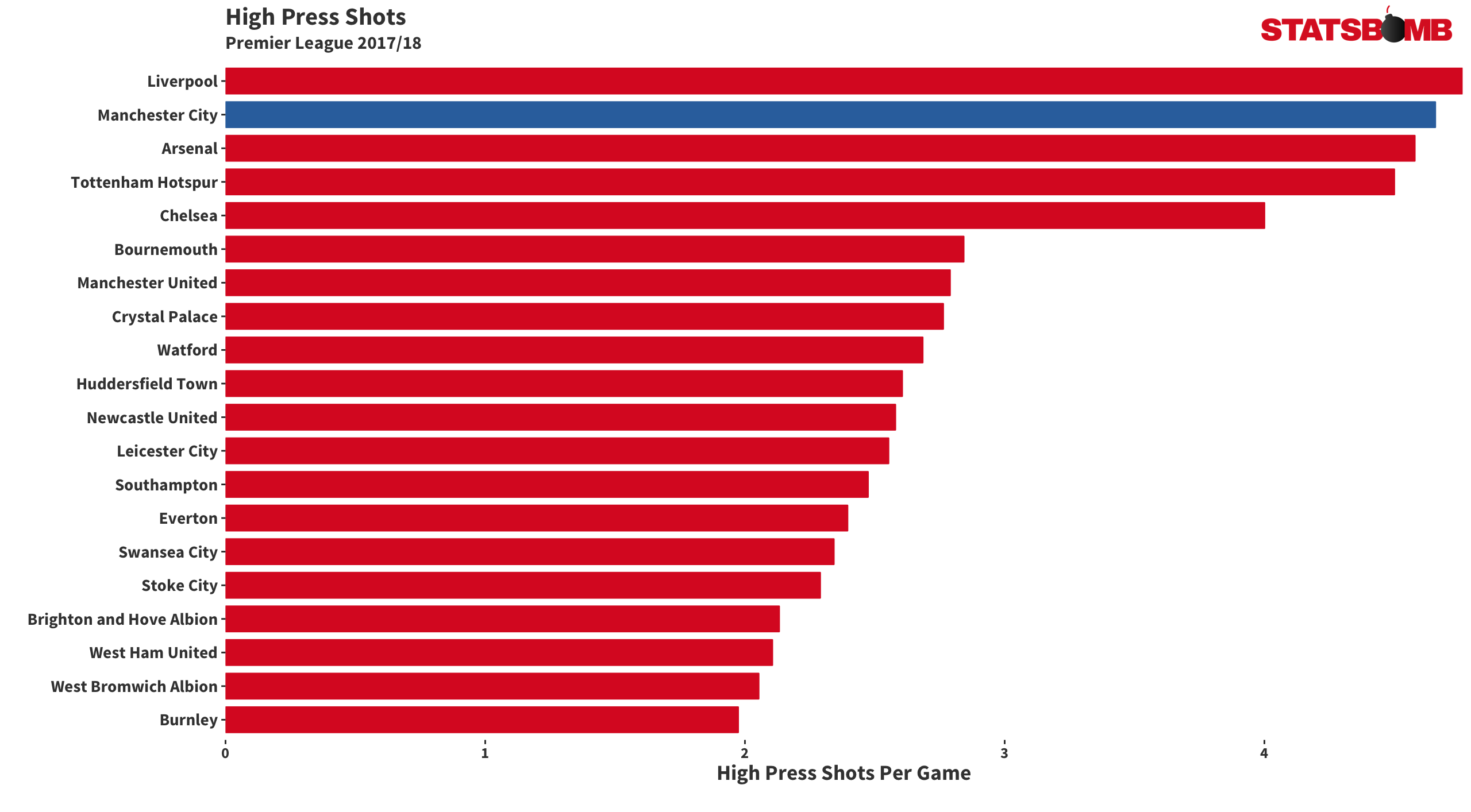
They weren't always brilliant, however, waning as the season rolled on. The instinct is to attribute this to facing defences that were ever-deepening out of fear of being steamrolled, but the data doesn't back this up. The average defensive distance of their opposition didn't really change over time - in fact they were pressed in their own half more often in the second half of the campaign. This became somewhat of a problem as, when City failed to complete a pass or dribble under pressure in their own half, they ended up conceding shots following that at a mid-table rate.
They didn't increase in conservatism either; the average position for their fullbacks, again, actually got higher up the pitch near the end of the campaign, and they were attempting just as many risky passes. Their creation from set pieces also slumped from January onwards, dropping from 0.38 xG per game to 0.28. There's all sorts of stuff you could run through but really it's just a combination of a few smaller problems, all likely brought on by the simple fact that it's hard to maintain a high level of performance over a lengthy season. Fatigue, familiarity, all sorts of factors start to kick in.
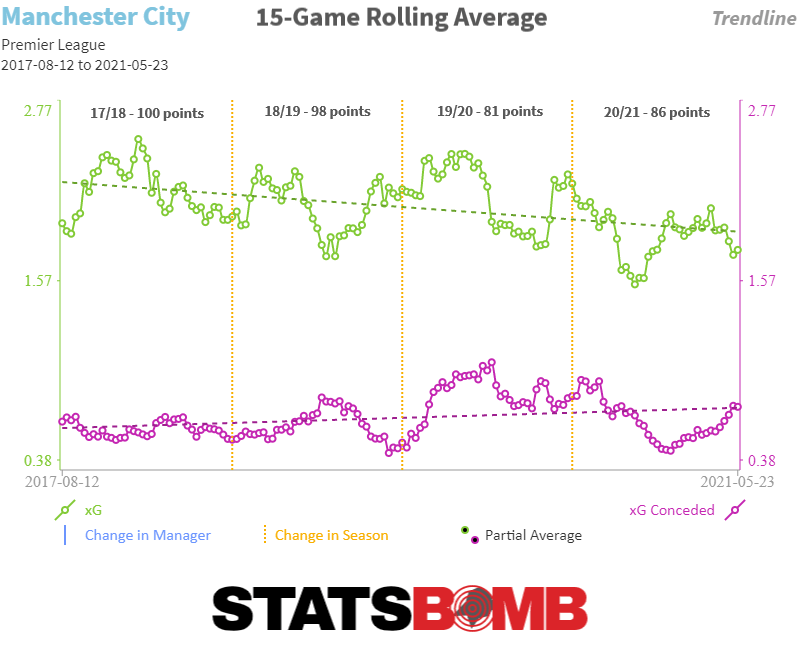
Then there's also that most dreaded of topics: reversion. Premier League winners generally follow a specific statistical trend. Most years, the clump of teams at the top of the table are quite close in actual quality. The teams who pull away from the pack benefit from hot streaks - mostly in terms of goal conversion both for and against - that exaggerate the differences between them and everyone else. They convert shots at a ridiculous rate, their goalkeepers save shots against them at a ridiculous rate, so on and so forth.
This isn’t to say these teams weren’t the best team in the land that season, or that they were overtly ‘lucky’. You can judge that for yourself. The point is that the margins are smaller than they appear when the league table is finalised. These aspects come down to earth as the league calendar turns over.
This was the case with Man City too. They converted shots at an obscene pace, and on our own xG model they overperformed by around 20 goals in attack. One shouldn’t expect this to repeat in 18/19, even with their stacked set of talent. The thing is though: they were so far above to begin with that it basically doesn't matter. In every regard you could consider - be it shot differential, expected goal difference, various passing metrics etc - they were clearly the leaders. Repeat that season without the variance bounce and they still walk it. Everything else was merely the hot sauce on top that helped them be next-level historic.
In reality, the team likely isn't as invincible as they first appeared. There are little holes in their game to be poked at, but the same is true of every team ever. There will be a couple of games next season - probably against Liverpool, natch - where the opposition will be able to blunt their attack and/or ferociously exploit the spaces they naturally leave open. That happens. No approach works all of the time, but Man City's works pretty damn often.
__________________
The player who completed the most throughballs in the PL last season was Kevin De Bruyne. In second place was Riyad Mahrez, who now plays for *checks notes* oh...
Obviously City didn’t make Mahrez their club record signing (£60m!) purely because of his throughball numbers, but this partially illustrates their reasoning. How do you improve a juggernaut attack? One way to go about it is to snap up possibly the only remaining player in your league that fits your stylistic template. Among players outside the top six Mahrez lead his peers by some margin in xG assisted. He’s a creative force to pile on top of other creative forces. At Leicester he mostly thrived in transition, but with his lovely weight of pass through small windows, as well as tight, slinky ball-control, he should slot into Guardiola's system nicely.
If there's one problem with Mahrez, it's his shot selection. The man is a serial bad-shot taker, with an unsightly xG per shot. Last season that didn’t matter as he banged in 12 goals anyway - nearly double his xG. Flash back to 2016/17 and he managed three non-penalty goals from a similar profile. Such is the variable life of the technically superb yet overly ambitious shooter. The one bright spot is that his off-ball movement is solid on the occasions he utilises it. He got on the end of 18 transition shots (shots taken within 20 seconds of the opposition losing the ball deep), the second most in the league.
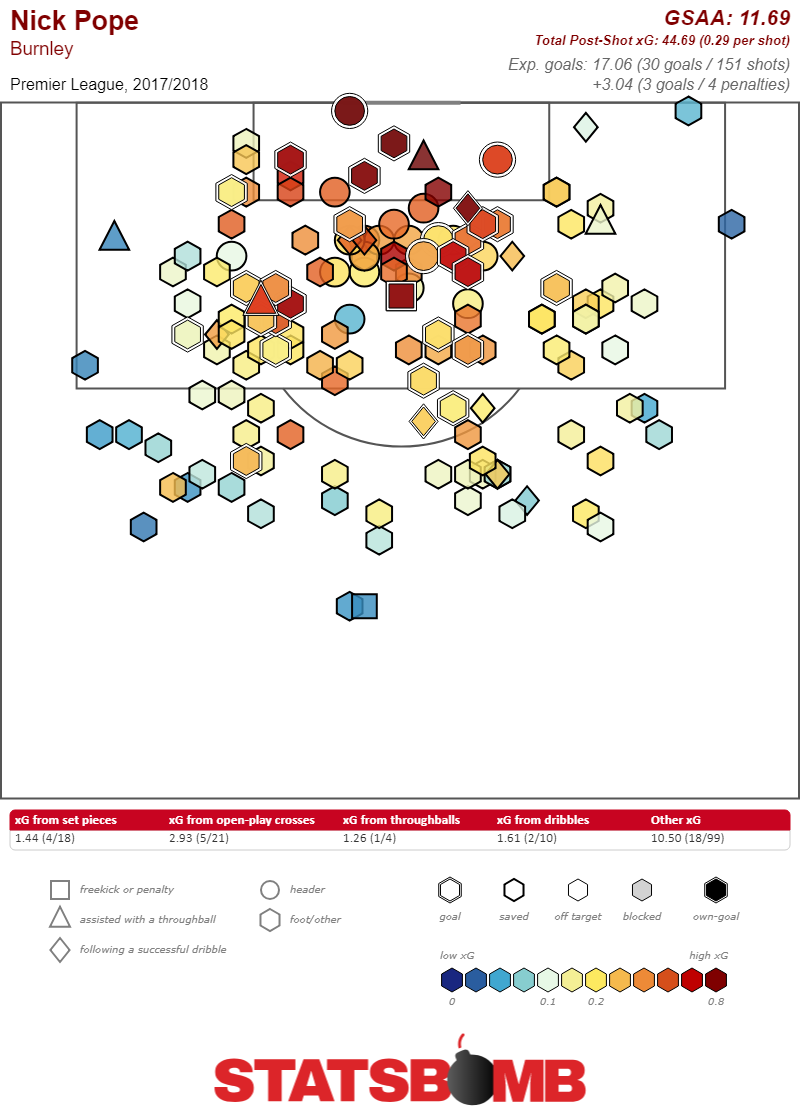
What really sticks out - aside from the pops from distance - is his predilection for coming inside and firing from wide angles. The man’s a solid dribbler and gets into dangerous locations using that skill, but the decision making from there is not so hot. He enjoys probing forward from central areas too. One imagines that Guardiola will emphasize the inventive side of his game. Pass don't shoot. And then, every few games, Mahrez will curl one in the top corner from a ridiculous angle just to remind you how gifted City are.
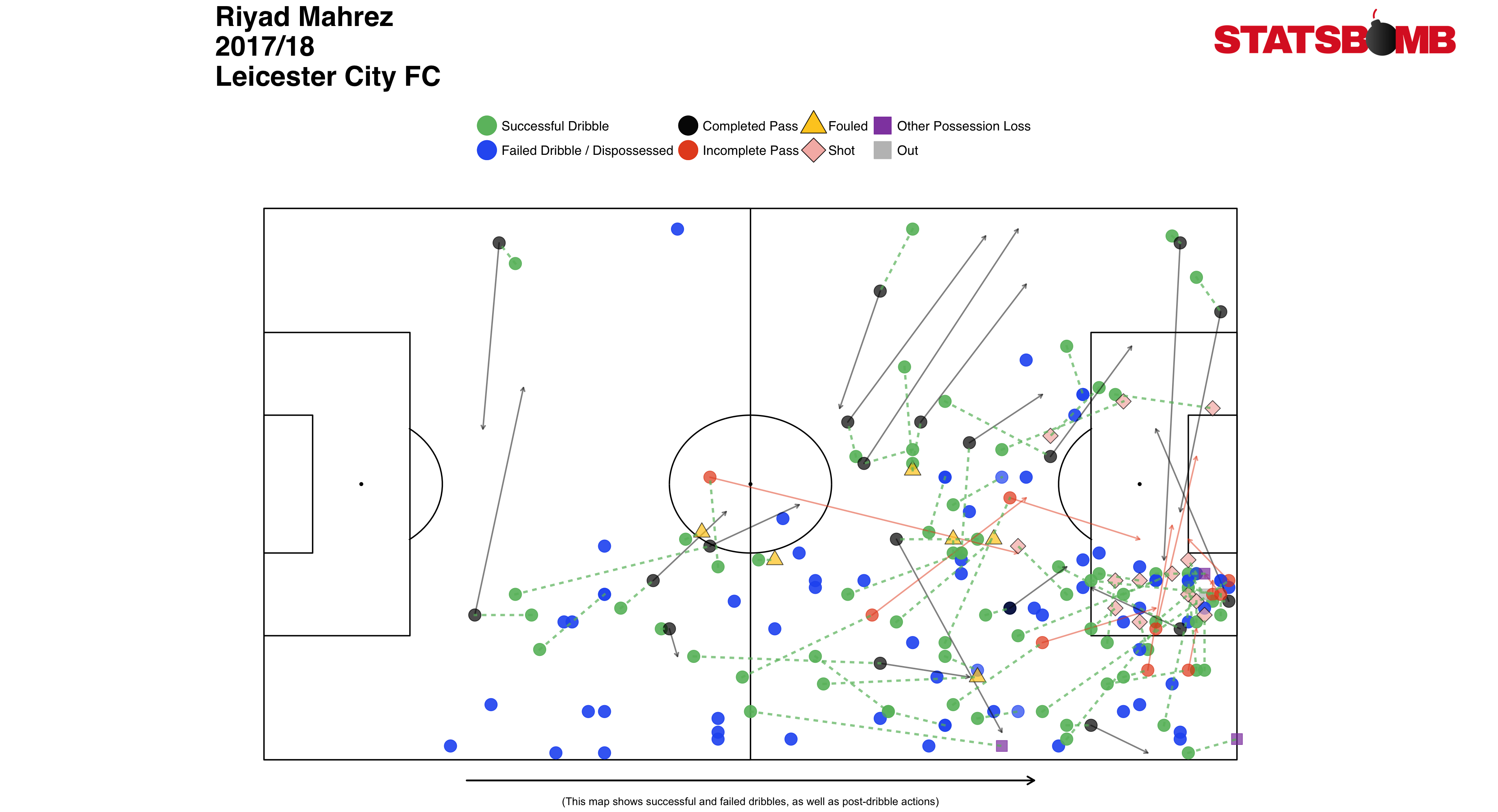
Is this addition at all necessary? No, let's be honest. It's a wild fee for what is essentially pouring more melted chocolate onto a running fondue fountain. Consider this though: Guardiola can now conjure up whatever positional potpourri he desires from a stable that includes Kevin De Bruyne, David Silva, Riyad Mahrez, Raheem Sterling, Leroy Sané, Gabriel Jesus and Bernardo Silva, with Sergio Agüero to pop up front. That’s absurd.
Beyond Mahrez, City's transfer window is curious more for the players they aren't buying. Silly as it may seem to say considering their overall riches, the midfield situation is looking a tad precarious. The current rotation of Fernandinho/İlkay Gündoğan/Fabian Delph is plenty talented but Fernandinho is 33 years old, Gündoğan is a constant injury risk and Delph is pulling double duty as a backup left back. Should one go down - or should their main left-back Benjamin Mendy have time off, forcing Delph to take that spot - that's some iffy territory. The club was heavily linked to Jorginho prior to him joining Chelsea, a missed move that would have gone a long way to quashing this unease. As it is, they may have to fall back on some Pep tactical tinkering if legs grow weary (an increased role for youngster Oleksandr Zinchenko?), or a winter window splurge.
__________________
Most seasons are preceded by repetitions of “insert team who won last season’s title here look well placed to defend it this year”. Invariably, things tend to spiral from there. The vagaries of football wreck merry hell on everyone's assumptions. Once the sheen has worn off and we come to see that teams are only ever that good for a short while, the landscape looks very different. However, with Manchester City, this isn’t just conventional lip service. There are concerns there, primarily the slightly uneven second half of last season and the potential for depth issues. Yet the aggregate gap they opened up was so large it would be foolish to suggest anything other than this: these are your indisputable 2018/19 title favourites. Have at 'em.
__________________
Thank you for reading. More information about StatsBomb, and the rest of our season previews can be found here.
Header image courtesy of the Press Association
